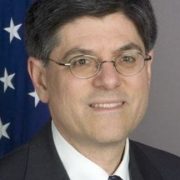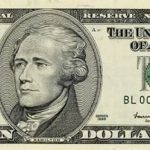Riding With Treasury Secretary Jack Lew
I was perusing my morning email in Zermatt a few weeks ago, and spotted the familiar White House address with the .gov ending. Would I be interested in meeting with the new Treasury Secretary, Jack Lew? It was just what I needed to lure me out of my Alpine lair back to the USA. I responded ?yes,? and instructions followed to meet him at the private jet terminal at San Francisco on August 22.
Half a globe and nine time zones later found me shaking hands with the nation?s 76th Treasury Secretary. The man is maybe 5?8? and squinted at me through wire frame glasses as he gave me a firm handshake. He wore the standard DC uniform, a dark solid suit with a white shirt, which I always thought made everyone look like undertakers.
?You can ride with me to my next event,? he said, inviting me into a spanking new tan GM Suburban with tinted windows. I thought ?Why not GM?? After all, until very recently the government owned a third of the troubled company. After the 1980 Chrysler bailout, that firm provided government rides for decades.
We then took off, escorted by a second Suburban packed with Secret Service agents and bracketed by two California Highway Patrol cars with red lights flashing, racing down Highway 101 at 80 miles an hour. ?Where are we going,? I wondered. ?Google, Apple, or Facebook??
Lew is the first Treasury Secretary appointed in many years who I did not already know. I dated back to the eighties with Tim Geithner in my Tokyo days after he read my books on Japan. Of course, I was long familiar with Hank Paulson from his time with Goldman Sachs, when I was first a competitor, and later a hedge fund client. So my goal today was to try to get the measure of Lew and figure out who he really was.
Lew told me that he was taking over a ship far more seaworthy than the one Geithner inherited four years ago. GDP has bounced back from a negative 5% to a 2% annual rate. Job growth rebounded from 700,000 losses to 200,000 gains a month. Automobile production returned from the grave, soaring from 9 million to 16 million annual units.
Taxes have been lowered for 98% of taxpayers, and major reform has been carried out in financial services, health care, and education. These gains have been made, despite a fiscal drag created by congress that is slowing the economy by 1% this year.
There was still plenty of work to do on jobs, a task made more difficult by the fact that the Republicans have opposed every jobs bill of the past four years. That is why boosting exports has been a top administration priority. The offshoring trend has slowed, and may even be reversing. Fixing our broken immigration system and getting college costs under control are also important.
Yes, it was all the standard Obama party line. But as this was our first meeting, I couldn?t expect a lot of confidences. Lew lacked the intellectual muscle of his predecessor, Geithner, who could discuss the most obscure parts of the financial history of the world with amazing depth. Lew struck as more of a technocrat with impressive experience in the day to day management of government institutions.
I asked Lew why he was known as the ?father of sequestration,? which has drained $85 billion out of the economy this year. He said the plan was a worst-case scenario that was never intended to be implemented. ?Who would have thought the Gang of Six wouldn?t get anywhere on this?? he asked.
Lew then went on to hint that an equally punitive Sequester II might be on the way in the wake of the next debt ceiling deadline in December. The Republicans are using the credit rating of the United States as a political lever, and the economy will suffer as a result.
Business and consumer confidence suffered a body blow during the last debt ceiling negotiations in 2011, and a jittery stock market plunged 25%. Lew confessed that he didn?t know how long cash on hand will last, and that social security checks, Medicare reimbursements, and payments to veterans may have to be halted.
I asked why the administration had declared war on the banking system.? He opined that 2008 was a failure of regulation and oversight. The financial system should be big and healthy enough to finance every good idea and provide loans to all credit worthy homebuyers. A strong and vibrant financial system was important for the US and the world.
But risks for taxpayers must be reduced, which is the goal of Dodd Frank.? Only 40% of the mandated rules have been drafted, and 60% of the deadlines have been missed, thanks to the overwhelming complexity of the task. International cooperation is needed to prevent business from flowing to the weakest regulator.
It was the day of the NASDAQ failure, and our conversation was interrupted by urgent calls from Washington several times. First there was SEC head, Mary Jo White, and then NASDAQ, Chief Robert Greifeld. When president Obama called for an update, the Treasury Secretary pulled out an armored and heavily encrypted cell phone and spoke in murmured tones. All I could make out during his calm and matter-of-fact explanation was ?server down? and ?no back up?.
The subject of China came up, and Lew confided that he had already met with president Xi Jinping several times. It was clear that the Middle Kingdom had over invested in manufacturing, creating a dangerous level of excess capacity. ?They agree with our recommendations,? he said with some surprise. I said I noticed that too. The real problem was in the execution, getting anything done in an emerging economy of 1.2 billion.
I cautioned the Treasury Secretary not to repeat the same mistake Geithner made in his early days and brand China a ?currency manipulator,? even if it was true. You don?t want to do that to someone who is holding $1 trillion of our debt, and until recently accounted for the purchase of half of all new Treasury issues.
We covered a broad range of other international financial issues, which I can?t discuss here for national security reasons. I hope I don?t read about them on Wikileaks someday.
A native of New York City, Lew did his undergrad at Harvard and his law degree at Georgetown. On graduation, he moved down the street and went straight into politics, where he worked for house majority leader, Tip O?Neill. He held several senior government posts during the Clinton administration. His wilderness years during the Bush administration were spent at New York University, and as the chief operating officer of Citicorp (C).
When president Obama took charge, Lew returned as an assistant Secretary of State, then Director of the Office of Management and Budget, and eventually to White House Chief of Staff. He is said to know more about the American budgeting process than any man alive, a talent that will prove useful in his current incarnation.
I couldn?t help but inquire about his pick for Ben Bernanke?s replacement, the next chairman of the Federal Reserve. Somewhat irritated, he shot back, ?I will keep my advice in the Oval Office where it belongs.?
I finally pulled out what seasoned journalists call their ?throw away? question, the one, if asked, is so annoying that it gets you thrown out of the room, or in this case, left by the side of the freeway. ?Why a lawyer as Treasury Secretary? Wouldn?t someone with a more substantial economic background be better suited to the task??
He smiled when he answered that our first Treasury Secretary, Alexander Hamilton, was also a lawyer (click here for my in-depth piece on him in ?The Two Century Dollar Short?). Several men have recently held the post that came from industry or other professions.
In that case, I cautioned him not to befall the fate of Hamilton, who was shot in a duel by vice presidential candidate, Aaron Burr, on a New Jersey shore.
Just then, our procession pulled up to the Computer History Museum where Lew had to deliver a speech. I said he knew my email address and could call any time. We shook hands, and he breezed past an onslaught of TV cameras. I stopped to offer some comments.
?Is he smart? one reporter asked? I replied ?They?re all smart. The United States has an incredible breadth of smart people. That?s why we are the most dominant country in history.?
I called a taxi to retrieve my car back at the airport. In the meantime, I strolled around this really cool museum, far and away the best of its kind in the world. It displayed a Babbage calculating engine, a WWII German ?Ultra? decoding machine, and Steve Wozniak?s first Apple I, which was built in a wooden case. I even saw the wooden slide rule with which I worked my way through college. ?Yikes,? I thought, I?m becoming an antique myself.
That night, I went home, donned my orange hazmat suit, and caught up on the new season of ?Breaking Bad.?



